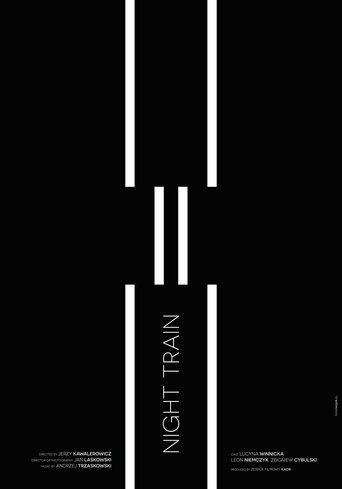"Pociąg" (1959), directed by Jerzy Kawalerowicz and produced by Zespół Filmowy Kadr, is a compelling Polish film that masterfully captures the essence of human interactions within the confined space of a train journey. Set against the backdrop of a snowy night, the film follows a diverse group of passengers as they navigate personal dilemmas and fleeting connections. The train, a microcosm of society, becomes a stage for the unfolding drama, where characters reveal their vulnerabilities and secrets. Kawalerowicz's use of the train's rhythmic motion and the stark, black-and-white cinematography intensifies the emotional undercurrents, making "Pociąg" a timeless study of human nature. The narrative of "Pociąg" is driven by the chance encounter between Marta, played by Lucyna Winnicka, and Jerzy, portrayed by Leon Niemczyk. Both characters are escaping their mundane lives, seeking something more meaningful, yet they are haunted by their pasts. Their interactions, filled with tension and unspoken desires, form the heart of the film. As the train hurtles through the night, their relationship evolves from cautious curiosity to a deep, albeit temporary, connection. This fleeting romance, set against the backdrop of the train's relentless journey, underscores the transient nature of human relationships. Kawalerowicz's direction in "Pociąg" is notable for its meticulous attention to detail and its ability to create a palpable sense of atmosphere. The film's use of sound, particularly the constant clatter of the train, adds a layer of realism that immerses the audience in the characters' world. The black-and-white visuals not only enhance the film's aesthetic but also symbolize the moral ambiguities and the blurred lines between reality and illusion that the characters grapple with. "Pociąg" is a testament to Kawalerowicz's skill in using cinematic techniques to explore complex emotional landscapes. "Pociąg" remains a significant work in Polish cinema, reflecting the socio-political tensions of post-war Poland while delving into universal themes of love, loneliness, and the search for meaning. The film's enduring appeal lies in its ability to resonate with audiences across different cultures and generations. By focusing on the intimate stories of its characters within the larger context of a train journey, "Pociąg" offers a poignant commentary on the human condition, making it a cinematic masterpiece that continues to captivate viewers.
Năm:1959
Thời lượng97 phút
Thể loạiPhim Chính KịchPhim Gây Cấn
Các quốc gia sản xuấtPoland
